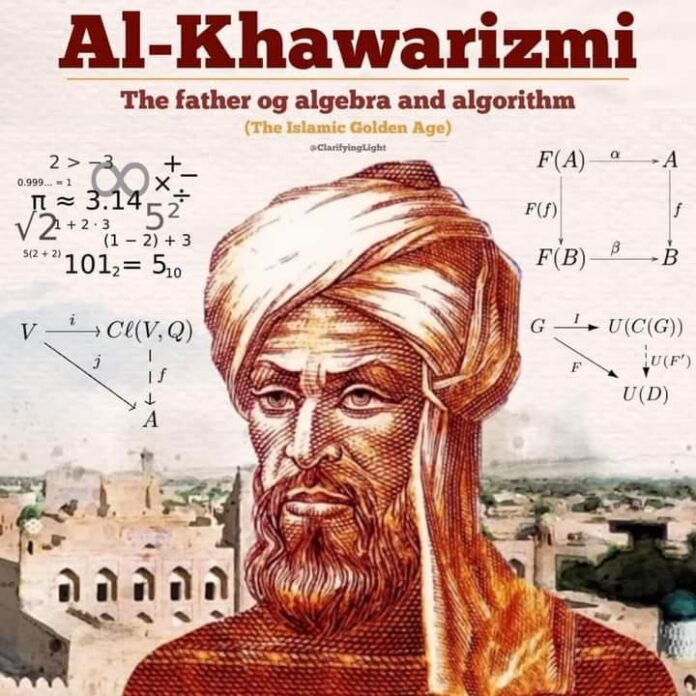Know Al-Khwarizmi, father of algebra, algorithm
By Ibrahim GIMBA, Abuja
Muḥammad ibn Mūsā al-Khwārizmī, or al-Khwarizmi was a Persian polymath from Khwarazm, who produced vastly influential works in mathematics, astronomy, and geography. Around 820 CE, he was appointed as the astronomer and head of the library of the House of Wisdom in Baghdad.
Born: Khwarazm
Died: 850 AD, Baghdad, Iraq
Full name: Muḥammad ibn Mūsā al-Khwārizmī
Nationality: Iranian
Era: Islamic Golden Age; (Abbasid era)
Influenced: Abu Kamil
Al-Khwārizmī lived in Baghdad, where he worked at the “House of Wisdom” (Dār al-Ḥikma) under the caliphate of al-Maʾmūn. The House of Wisdom acquired and translated scientific and philosophic treatises, particularly Greek, as well as publishing original research.
Al-Khwārizmī’s work on elementary algebra, Al-Kitāb al-mukhtaṣar fī ḥisāb al-jabr waʾl-muqābala (“The Compendious Book on Calculation by Completion and Balancing”), was translated into Latin in the 12th century, from which the title and term algebra derives. Algebra is a compilation of rules, together with demonstrations, for finding solutions of linear and quadratic equations based on intuitive geometric arguments, rather than the abstract notation now associated with the subject. Its systematic, demonstrative approach distinguishes it from earlier treatments of the subject. It also contains sections on calculating areas and volumes of geometric figures and on the use of algebra to solve inheritance problems according to proportions prescribed by Islamic law. Elements within the work can be traced from Babylonian mathematics of the early 2nd millennium BCE through Hellenistic, Hebrew, and Hindu treatises.
In the 12th century a second work by al-Khwārizmī introduced Hindu-Arabic numerals and their arithmetic to the West. It is preserved only in a Latin translation, Algoritmi de numero Indorum (“Al-Khwārizmī Concerning the Hindu Art of Reckoning”). From the name of the author, rendered in Latin as Algoritmi, originated the term algorithm.
A third major book was his Kitāb ṣūrat al-arḍ (“The Image of the Earth”; translated as Geography), which presented the coordinates of localities in the known world based, ultimately, on those in the Geography of Ptolemy (flourished 127–145 CE) but with improved values for the length of the Mediterranean Sea and the location of cities in Asia and Africa. He also assisted in the construction of a world map for al-Maʾmūn and participated in a project to determine the circumference of the Earth, which had long been known to be spherical, by measuring the length of a degree of a meridian through the plain of Sinjār in Iraq.
READ ALSO: Fatima al-Fihri: Founder of World’s First University, Library over 1200 years ago
Finally, al-Khwārizmī also compiled a set of astronomical tables (Zīj), based on a variety of Hindu and Greek sources. This work included a table of sines, evidently for a circle of radius 150 units. Like his treatises on algebra and Hindu-Arabic numerals, this astronomical work (or an Andalusian revision thereof) was translated into Latin.
algorithm, systematic procedure that produces—in a finite number of steps—the answer to a question or the solution of a problem. The name derives from the Latin translation, Algoritmi de numero Indorum, of the 9th-century Muslim mathematician al-Khwarizmi’s arithmetic treatise “Al-Khwarizmi Concerning the Hindu Art of Reckoning.”
Al-Khwarizmi developed the concept of the algorithm in mathematics (which is a reason for his being called the grandfather of computer science by some people). Al-Khwarizmi’s algebra is regarded as the foundation and cornerstone of the sciences.
Follow the Neptune Prime channel on WhatsApp: https://whatsapp.com/channel/0029Va74ZvU2v1IqKByXoX3d
Do you have breaking news, interview request, opinion, suggestion, or want your event covered? Email us at neptuneprime2233@gmail.com


